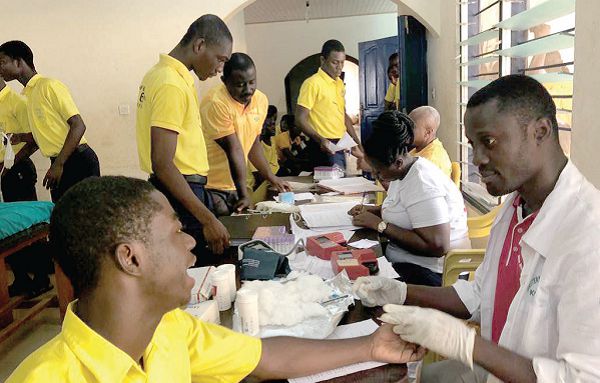
Pope John’s SHS celebrates Val’s Day with blood donation
Students of Pope John’s Senior High School and Minor Seminary in Koforidua in the Eastern Region yesterday undertook a blood donation exercise on the school compound as part of this year’s Valentine’s Day celebration.
The exercise, which also attracted the public, was organised by the mobile telecommunications company, MTN.
The ‘Save a Life’ blood donation campaign is an annual nationwide exercise initiated in 2011 by MTN to stock blood banks across the country to facilitate healthcare delivery.
According to the company, its target was to obtain at least 200 units of blood in the Eastern Region alone and a national average of 3,500 units from 19 bleeding centres across the 10 regions this year.
Turnout
The students, who wore yellow shirts over blue-black shorts, turned out in their numbers to participate in the exercise, which was supervised by the Eastern Regional Blood Organiser, Madam Philomena Quayson.
Since the inception of the campaign, the company had mobilised about 9,500 units of blood across the country, the Area Sales Manager of MTN, Mr David Woase, said.
“We are looking forward to reaching the 10,000 units milestone this year,” he added.
“We have recorded so many heartwarming stories of people whose lives have been saved through this exercise. Some of these stories have been told by our own staff, while others are from our customers.
“From a little over 100 units of blood that was recorded in the first exercise, we have achieved great successes,” the manager stated.
Mr Woase underlined the importance of the campaign and stressed that blood transfusion had helped save many lives, including those of mothers and babies.
Significance
To maintain adequate blood supply to patients, the World Health Organisation (WHO) estimates that between one and three per cent of the population need to become blood donors.
According to Madam Quayson, Ghana has an estimated population-based blood requirement of 270,000 units but that only 160,000 units were collected, leaving a deficit of 40 per cent.
She, therefore, encouraged Ghanaians to donate blood generously to ensure adequate supply to patients who might need it during emergency situations.
“We need blood every day. We do not always have to wait for emergencies before we look for blood,” she added.
